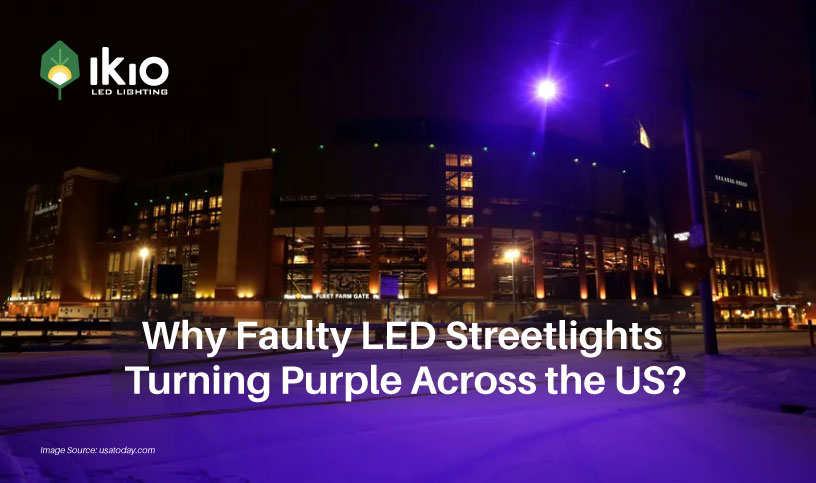
LED streetlights across the United States have been turning purple due to a manufacturing defect that causes the internal layers to fail. The issue, first noticed in 2021, has appeared in at least 30 states and several parts of Canada and Ireland.
As these lights begin to malfunction, they emit a violet or bluish-purple glow instead of the intended white light. Many of the affected fixtures are gradually replaced by local authorities, leading to repeated appearances and disappearances of purple lighting across neighborhoods and roads.
The unusual hue has been described by residents as eerie and unsettling. However, it has also attracted attention from photographers and artists who have documented the phenomenon for its unique visual appeal.
Personal Safety Concerns Raised
In Studio City, California, Evan Lovett, 46, a resident and host of the podcast L.A. in a Minute, said the purple streetlights began appearing in his area last summer. He initially described the aesthetic as “a very eerie vibe, in a cyberpunk sort of way.”
Lovett’s perspective changed after his home was burglarized in early February while he and his family were away. He now believes the dim, bluish lighting contributed to reduced visibility and made the area more vulnerable.
“I’m a fan of the color purple,” Lovett said. “But I don’t want my streetlights to be that way. It’s kind of dangerous.”
Widespread Incidents Reported
The issue is not limited to California. In Milwaukee, Wisconsin, more than 300 streetlights installed in 2018 began changing color by 2021. Similar problems were reported the same year in Eau Claire, Wisconsin; Schaumburg, Illinois; and Palm Beach, Florida.
A total of more than 30 states have experienced the problem, with continued cases being reported through 2024 and into 2025.
Theories and Misconceptions
Several incorrect theories have circulated online regarding the cause of the purple lights. These include assumptions that the lighting is
More energy-efficient
Safer for wildlife
Used to raise awareness for domestic violence
Designed to make drug use more difficult
Experts have confirmed that none of these theories are accurate. The lights are not symbolic or intentional.
Technical Cause Identified
 Image Source: usatoday.com | Lynn Davis
Image Source: usatoday.com | Lynn Davis
Experts have traced the issue to a flaw in the LED chip design. Specifically, it is related to the delamination of the phosphor-silicon layer, which is used to filter blue light into white.
When this layer cracks or peels off, the blue diode underneath becomes more visible, resulting in the purple glow.
LEDs do not emit white light naturally. They typically combine a blue light source with a yellow phosphor layer to produce white. As the yellow layer deteriorates, the balance shifts and produces lavender, violet, or plum-colored light.
Expert Investigation and Findings
In 2024, lighting researchers from the LED Systems Reliability Consortium conducted a detailed analysis of 28 failed LED modules provided by the North Carolina Department of Transportation.
The modules were manufactured in mid-2017 and installed around 2018. Most began experiencing the purple hue after three to four years of use.
According to the analysis, the issue lies not in the phosphor itself, but in the binder—most likely silicon—that holds the layer in place.
“It’s not the phosphor itself that’s failing but the binder that’s attaching it to the LED,” said Peter Palomaki, optics expert and chief scientist at Palomaki Consulting in Massachusetts.
 Image Source: theautopian.com
Image Source: theautopian.com
Safety Implications for Drivers
Lighting experts have emphasized that defective lights pose real safety risks, especially for motorists.
“If you’ve driven through areas where there are a lot of these purple streetlights, you know that they’re glare-y and uncomfortable,” said J. Lynn Davis, a member of the Illuminating Engineering Society. “It could distract drivers and create some issues.”
Artistic Reactions
Despite the technical failure, some individuals have embraced the glow for its visual impact.
“The color makes the ordinary look extraordinary,” said Selina Román, photography professor at Ringling College of Art and Design in Sarasota, Florida.
Ongoing Replacement Efforts
Most cities are continuing to replace the faulty lights as they fail. Until the issue is fully resolved, intermittent purple lighting may continue to appear across the country.